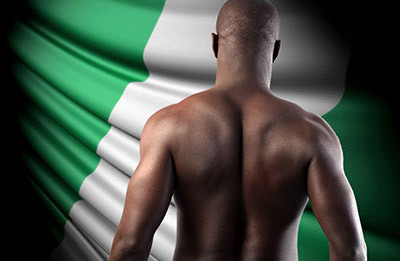Search this site
| contribute | advertise |
| terms of use |
© 2024 Mambaonline cc
| Lesbian South Africa |
| Lifestyle | News |

NIGERIA: A SMALL SHIFT IN GAY AND LESBIAN ACCEPTANCE
 While the vast majority of Nigerians continue to support the country’s anti-gay law, a new survey reveals that tolerance towards lesbian, gay and bisexual (LGB) people is slowly on the rise in Africa’s largest democracy.
While the vast majority of Nigerians continue to support the country’s anti-gay law, a new survey reveals that tolerance towards lesbian, gay and bisexual (LGB) people is slowly on the rise in Africa’s largest democracy.
The poll of 1,000 Nigerians on the subject of homosexuality was conducted by the Initiative for Equal Rights in partnership with the Solidarity Alliance for Human Rights in Nigeria.
They found that a whopping 87% of those surveyed expressed their support for the nation’s Same Sex Marriage Prohibition Act, but noted that this reflects a decrease compared to previous surveys.
In comparison, in 2010, 96% of Nigerians said they were opposed to relationships between same-sex couples, and in 2013, 92% of those polled said they supported the law.
The Same Sex Marriage Prohibition Act, passed 18 months ago, prescribes prison terms for anyone engaging in or endorsing homosexual activity, same-sex marriage, or social organisations that lobby for LGBTI issues.
The survey also found that an overwhelming majority of Nigerians (90%) do not think people are born LGB, suggesting that most believe sexual orientation is acquired later in life. The idea that young people can be “converted” to homosexuality is pervasive in many parts of Africa and has often been used to justify anti-gay laws.
Only 17% of adult Nigerians polled said they know a lesbian, gay, or bisexual person, but, promisingly, younger adults (aged 18-25) are more likely (30%) to be familiar with someone who is LGB.
Over half (52%) of those who believe people are born LGB know someone in their family, a friend, or someone in their locality who is.
The survey further found that only 11% of Nigerians are willing to accept an LGB family member and just 30% agree that LGB people should have access to healthcare, housing, and education.
Bisi Alimi, founder of the Bisi Alimi Foundation, commented that the poll indicates that Nigerians are not inherently homophobic but believe myths and misinformation in the absence of accurate information around gender and sexuality.
“The trend in this survey has shown that with a conducive environment to provide unrestrictive and unbiased information about gender and sexuality in Nigeria, we will be able to create a platform for discussion and dialogue where views can be shared and opinions expressed without fear,” explained Alimi.
“This survey reflects a massive gap in knowledge about sexuality and human rights,” added Olumide Makanjuola, Executive Director of The Initiative for Equal Rights.
“This lack of knowledge explains why LGBT people continue to experiences human rights violations. We therefore need to provide holistic education and information on sexuality and human rights. This must be a joint effort between the Nigerian government and the civil society organisations in Nigeria.”
Same-Sex Marriage Prohibition Act gives “impunity for violence against LGBTI people”
The survey comes on the heels of the release of another separate report confirming that the country’s anti-gay law has sharply curbed freedom of expression, assembly, and association.
Authored by PEN American Center, PEN Nigeria, and the Leitner Center for International Law and Justice at Fordham Law School, the report uses individual testimonies from LGBTI Nigerians to demonstrate how the law “has distorted Nigeria’s cultural and political landscape by silencing the country’s LGBTI community through state-sanctioned intimidation and marginalisation.”
These testimonies, say the groups, detail the cascading effects of a law that, while purporting to target same-sex marriage, “has infringed upon rights to free speech, access to health care, housing, and employment, interfered with civil and political rights, and led to wholesale impunity for violence against LGBTI people.”
The report documents the cases of writers unable to publish their books, poems, and stories, organisations forbidden from meeting, social media communities chilled by government infiltration, and rising incidents of blackmail and extortion directed at LGBTI individuals.
“LGBTI Nigerians cannot express their identities, write or publish about their experiences, or even advocate for their own human rights,” said PEN Executive Director Suzanne Nossel. “The law is essentially self-enforcing, barring most challenges to its own legality as prohibited LGBTI advocacy and effectively legalising vigilante justice against gay individuals.”
Nigerian PEN President Tade Ipadeola expressed his grave concerns about the impact of the Same Sex Marriage Prohibition Act on literary and artistic expression in Nigeria.
“We have seen writers and artists forced to put down their pens and brushes, hide their work and, in some cases, leave the country. The cost of this law is measured not only in the abuses suffered by these individuals, but in a Nigerian cultural landscape that is being deprived of its full diversity.”
Nossel added: “Free expression of one’s own identity and opinions is the bedrock of all human rights. Where this right is denied, all forms of personal freedom are in jeopardy—for not just the LGBTI community, but also the population at-large.”
The post Nigeria: A small shift in gay and lesbian acceptance appeared first on MambaOnline - Gay South Africa online.


